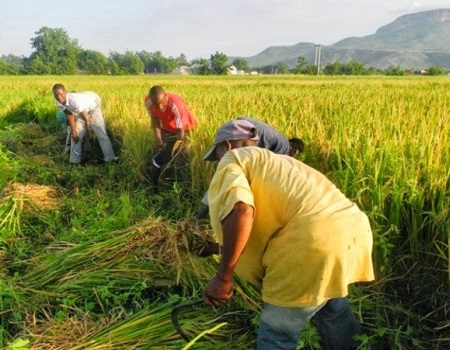[ad_1]
Farmers in Oyo state have called on the state Ministry of Agriculture to take ownership of propagating climate information among stakeholders and support the implementation of resilience projects, including planting arable crops that can help reduce their exposure to weather-related risks.
The call was contained in a communiqué issued at the end of a one-day mid-season interactive workshop with stakeholders in the agriculture sector in the state, and held recently at the Nigerian Institute for Social and Economic Research (NISER), Ibadan, the state capital.
“Climate information is required in a timely and relevant manner, as such the method of getting the yearly Seasonal Climate Predictions (SCP) across to stakeholders needs to be improved”, the workshop observed during the interactive session, lamenting heavy losses being experienced by farmers due to climate variability.
It however expressed concern over the highly fluctuating weather observed in the past five years which is impacting negatively on agricultural businesses while questioning the reliability of the 2022 SCP, where the forecast didn’t perform as expected in some parts of the state. This, according to experts, could be as a result of increasing micro-climate trend observed in many parts of Nigeria.
It was also observed that the major channel of information dissemination, especially those related to agriculture in Oyo State is through the state government-owned broadcasting station, which currently runs an agriculture programme across a network of local private radio stations.
However, the workshop advised that the stations should facilitate broadcast of climate-related information, alongside current radio programmes that are supporting dissemination of information in the state while Agro-commodity firms (e.g Psaltry International) that are already reaching out to farmers through radio network be approached and partnered to take advantage of Human and Environmental Development Agency’s experience in airing climate and weather information.
The workshop also urged the strengthening of inter-governmental relationships particularly between NiMet and the Institute of Agricultural Reseasrch and Training (IAR&T) which should commence with an engagement that will build the capacity of I.A.R&T staff to use information from NiMet and help address the challenges of farmers and agriculturists in the state.
In the same vein, stakeholders in livestock production requested that the NiMet’s climate information product should include advisory relevant to livestock, stressing: “this should be very visible in all their products (App, bulletin etc) for the South West”.
In addition, the workshop recommended that an update of NiMet crop advisory for Oyo State was required for trees and arable crops for the next cropping season, noting that this can be achieved by the active collaboration of NiMet and I.A.R&T to develop climate advisory using the agronomic data of arable crops with I.A.R&T.
The workshop emphasised the need for all the local government areas in the country to work out a plan with NIMET towards increasing weather stations in their various communities, adding that this will also increase weather points across the country.
“This will improve the accuracy of the data that NIMET will generate and their early warning system”, the workshop noted while urging the local governments, in collaboration with NIMET, to also work on a flood alert mechanism.
In attendance were representatives of critical stakeholders including farmers association, CSO/NGOs, and Research Institute/Academia who assessed the effectiveness of the delivery and impact of the Seasonal Climate Predictions (SCP) from the Nigeria Meteorological Agency (NIMET).
Others are; the representative of the Ministry of Agriculture, Oyo State Agricultural Development Programme (OYADEP), representatives of the Agro Allied Crop farmers and Arable Tree Crop Farmers Association and representative of research Institute and Academia from I.AR.&T Ibadan and Cocoa Research Institute of Nigeria (CRIN).
[ad_2]
Tribune








